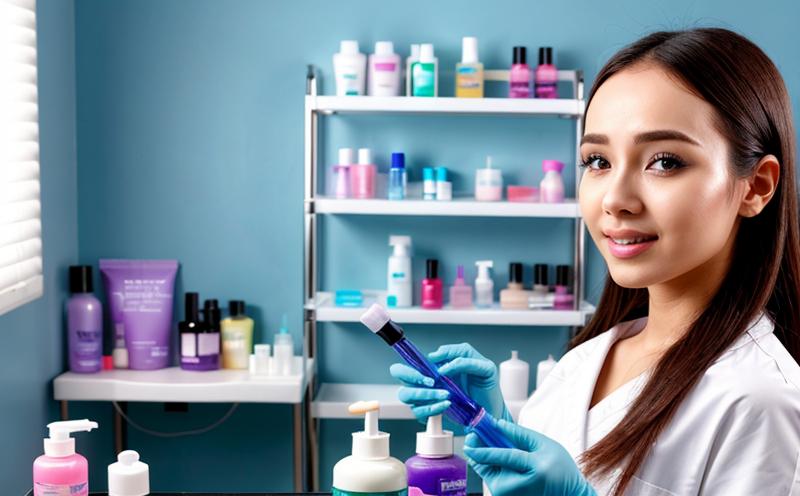EP 2.6.31 Microbiological Examination of Cosmetics Water Quality
The EP 2.6.31 microbiological examination is a critical component in ensuring the safety and quality of cosmetics, particularly those that contain water or aqueous solutions. This examination ensures that the water used in the formulation process meets stringent hygienic standards set by regulatory bodies such as the European Pharmacopoeia (EP) and other international standards like ISO and ASTM.
The EP 2.6.31 test focuses on detecting microorganisms, including bacteria, fungi, and yeasts, that can potentially cause contamination in cosmetic products. Water is a primary medium for microbial growth, and even small amounts of contaminants can lead to product spoilage or adverse health effects. This testing ensures that the water used is safe for consumer use.
The testing process typically involves several steps:
- Sampling: Aseptically collect samples from different stages of production.
- Pretreatment: Prepare the sample by diluting if necessary to ensure accurate enumeration.
- Culture and Identification: Use appropriate media such as Tryptic Soy Agar (TSA) for bacteria, Sabouraud Dextrose Agar (SDA) for fungi, and Chromogenic Media for specific pathogen detection.
- Incubation: Incubate the samples under controlled conditions to allow growth of microorganisms.
- Enumeration: Count and identify viable colonies on the agar plates. This may involve streaking techniques or use of automated colony counters.
The results are then compared against acceptance criteria specified in EP 2.6.31, which typically include limits for total bacterial count, yeast and mold count, and specific pathogen detection. Compliance with these standards ensures that the cosmetic product meets safety regulations and can be marketed safely.
Failure to adhere to these standards can lead to legal issues, loss of consumer trust, and potential health risks. By conducting this examination, laboratories ensure that water used in cosmetics production is free from harmful microorganisms, thus safeguarding public health and maintaining brand reputation.
Quality and Reliability Assurance
The quality and reliability assurance of the EP 2.6.31 microbiological examination are paramount to ensure consistent results that meet regulatory requirements. This involves rigorous calibration of equipment, standardization of procedures, and regular training for laboratory personnel.
- Calibration: All instruments used in the testing process must be regularly calibrated against known standards to ensure accurate measurements.
- Standard Operating Procedures (SOPs): Standardized protocols are strictly followed throughout the entire testing process, from sampling to final analysis. These SOPs are designed to minimize variability and ensure reproducibility of results.
- Training: Laboratory personnel undergo continuous training to stay updated on the latest methodologies and technologies in microbiological testing. Regular proficiency tests further validate their expertise.
In addition, quality assurance includes regular audits and peer reviews to identify and rectify any deviations from established protocols. The use of advanced analytical techniques such as PCR-based methods for specific pathogen detection enhances reliability by providing faster and more accurate results.
By adhering to these strict quality control measures, the laboratory ensures that every batch of water used in cosmetic production meets the highest standards of microbiological purity, thereby safeguarding consumer health and maintaining compliance with international regulations.
Customer Impact and Satisfaction
The EP 2.6.31 microbiological examination not only benefits the manufacturer but also directly impacts the end consumer by ensuring product safety and quality. For manufacturers, this testing ensures that they are in compliance with regulatory standards, which can prevent costly recalls and legal disputes.
Consumers benefit from products that meet stringent hygiene standards, reducing the risk of adverse health effects such as allergic reactions or infections. This not only enhances consumer trust but also builds a positive brand image. For R&D engineers and quality managers, this service provides critical data for process optimization and product development, ensuring that new formulations are safe and effective.
Moreover, compliance with international standards like EP 2.6.31 can open up export markets where stringent regulatory requirements apply. This ensures that products meet the standards of countries around the world, expanding market reach and potential sales.
Customer satisfaction is further enhanced by providing timely, accurate reports that help manufacturers make informed decisions regarding production processes. The laboratory’s commitment to quality and reliability also fosters long-term relationships with clients, ensuring repeat business and referrals.
Competitive Advantage and Market Impact
The EP 2.6.31 microbiological examination provides a competitive edge by ensuring that cosmetic products are not only safe but also of the highest quality. This service can differentiate manufacturers from competitors who may not adhere to such stringent testing protocols.
By meeting or exceeding regulatory requirements, companies demonstrate their commitment to consumer safety and satisfaction. This can lead to increased market share as consumers increasingly favor brands that prioritize health and safety standards. For R&D teams, the ability to consistently produce safe products can accelerate product launches and innovation cycles.
In addition, compliance with international standards can open up new markets for manufacturers, particularly in regions where regulatory requirements are stringent. This service ensures that products meet the standards of countries around the world, expanding market reach and potential sales.
The reputation of a company that consistently delivers high-quality products is enhanced, leading to increased customer loyalty and positive word-of-mouth. This can translate into long-term business growth and sustainability in an increasingly competitive industry.





